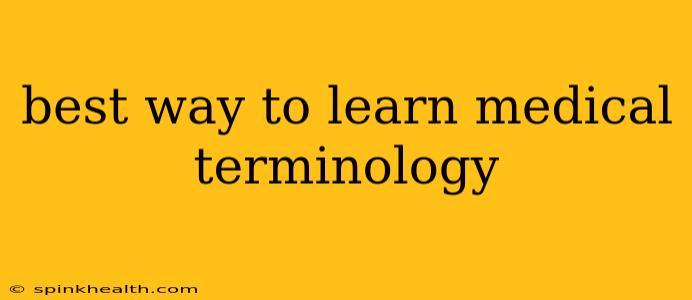Decoding the Language of Medicine: The Best Way to Learn Medical Terminology
The world of medicine is fascinating, but its language can feel like a foreign dialect. Medical terminology, with its Greek and Latin roots, can seem daunting at first. However, mastering it isn't about memorizing endless lists; it's about understanding the building blocks. My journey into medical terminology began with frustration – a constant cycle of looking up words, only to forget them moments later. But I discovered a system, a roadmap if you will, that transformed the process from a chore to an engaging puzzle. Let me share my story and the strategies that worked for me.
It all started with a burning curiosity about the human body. I devoured anatomy books, fascinated by the intricate workings within. But the descriptions? A wall of jargon. That's when I realized that true understanding wouldn't come without deciphering the language. My approach wasn't rote memorization, but a strategic breakdown, focusing on the components that create the whole. Think of it like learning a language: mastering prefixes, suffixes, and root words is key to understanding the complete word.
What are the most effective ways to learn medical terminology?
This is a question many aspiring healthcare professionals, and even curious individuals, grapple with. There's no single magic bullet, but combining several approaches is the most effective strategy.
Breaking Down the Code: Prefixes, Suffixes, and Root Words
Think of medical terms as LEGO bricks. The prefixes, suffixes, and root words are the individual bricks, and combining them creates a complex yet understandable structure. Let's take "cardiomegaly," for instance.
- Cardio-: refers to the heart.
- -megaly: means enlargement.
- Therefore, cardiomegaly means enlargement of the heart.
Learning these core components unlocks the meaning of countless medical terms. Flashcards, mnemonics (memory aids), and even creating your own vocabulary lists can help solidify this foundation.
Are there any free resources available to learn medical terminology online?
Absolutely! The internet offers a plethora of free resources. Many universities provide free online courses and resources dedicated to medical terminology. Look for websites offering interactive quizzes, vocabulary builders, and online dictionaries that specialize in medical terms. YouTube is another excellent resource, with channels dedicated to explaining medical terminology in clear, concise ways. Remember to verify information across multiple sources for accuracy.
How long does it take to learn medical terminology?
The time it takes depends on your learning style, the intensity of your study, and your goals. For someone studying for a healthcare profession, it might take months of consistent effort. For those simply aiming for a basic understanding, a few weeks of focused study could be sufficient. Consistency is key; regular review and active use of the terminology are essential for retention.
What are some helpful tools or techniques for memorizing medical terms?
Beyond flashcards and mnemonics, try these effective techniques:
- Contextual Learning: Encountering medical terms within their context (e.g., within a medical case study or anatomical illustration) strengthens memory and understanding.
- Spaced Repetition: Review terms at increasing intervals to combat forgetting. Apps like Anki utilize this technique.
- Teaching Others: Explaining medical terms to someone else solidifies your own understanding.
- Visual Aids: Diagrams, charts, and illustrations can make learning more engaging and effective.
What is the best way to use medical terminology in everyday conversations?
While using advanced medical jargon in casual conversation might sound impressive (and maybe slightly pretentious!), its practical application lies primarily within healthcare settings. However, understanding the basic building blocks can enhance your understanding of medical information presented in the news or in popular science articles.
My journey wasn't just about memorization; it was about gaining a deeper understanding of the human body and its complexities. The language of medicine is a key to unlocking this fascinating world. By focusing on the fundamentals and employing effective learning strategies, anyone can navigate the seemingly complex landscape of medical terminology. Embrace the challenge; it's a rewarding journey of discovery.

